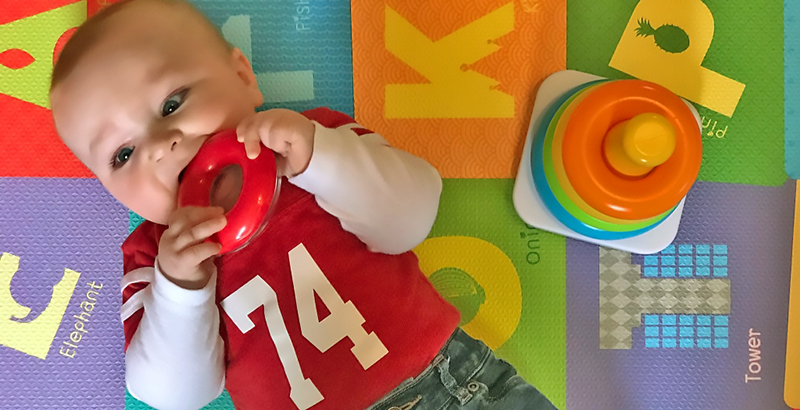What You Never Realized You Were Teaching Your Child About Grit & Resilience: MIT Study Captures Techniques That Work for Babies as Young as 13 Months

Even at MIT, no one’s been able to create a computer as powerful as the brain of a baby.
“They’re better at doing this fast learning from one or two examples than any computer algorithm we have right now,” MIT graduate student Julia Leonard said. “That’s a big interest here — everyone’s like, ‘We want a computer to learn like a baby.’”
Leonard was curious about how babies learn too, so she gathered up more than 200 to analyze their genius brains. Specifically, she was interested in studying how babies learn skills like grit and growth mindset from adults, especially as schools are placing more emphasis on developing student character and social-emotional competencies.
In a study Leonard published in Science, she found that babies were able to persist in a difficult task if they first saw an adult struggle to succeed, suggesting that grit and perseverance can be taught by example to the powerfully observational young baby brain.
Leonard conducted her research on babies 13 to 18 months old. She had one set of babies watch an adult struggle for 30 seconds to retrieve a toy from a tomato container and succeed, and then repeat the process to try to remove a key chain from a carabiner. Another group of babies watched an adult successfully complete these tasks without any struggle.
Then the babies were shown a toy that played music, but only the researchers knew how to activate the sound. The babies were given the toy, and the researchers noticed that the ones who had watched an adult struggle beforehand made more attempts at pushing a button on the toy to try to get it to play music. The babies who had watched the adult who didn’t struggle exerted less effort and pushed the button fewer times than their toddler peers.
The experiment showed that the babies’ actions were not mere imitation, Leonard said, because the children were given an entirely different toy than the ones they saw the adults struggling with.
For Leonard, these results revealed that after just a few brief moments of observation, babies’ brains are able to learn the value of effort and persistence.
“This study suggests that we’re not born necessarily with a certain amount of grit that can’t change,” Leonard said. “It’s not a stable character trait. It can be learned and influenced by social context.”
However, it is unclear from the study how long these effects last, or whether these effects apply as well at home as in a laboratory. But if parents do want to try modeling grit, the best way is to make sure the adult is engaging the child with eye contact and saying the child’s name while demonstrating overcoming a difficult task. Leonard’s study found that adults who used these cues when struggling with the toys in the study had a greater effect on the children’s perseverance than the adults who purposely didn’t engage with the children but solely modeled the effort-filled behavior.
Character traits like grit and perseverance are teachable, according to researcher Angela Duckworth, author of the book Grit: The Power of Passion and Perseverance. “The parenting style that is good for grit is also the parenting style good for most other things: Be really, really demanding, and be very, very supportive,” she said in an interview with The New York Times.
But, Duckworth added, “you cannot will yourself to be interested in something you’re not interested in,” and grit is best developed in areas where people already have passion.
Journalist Paul Tough, author of How Children Succeed, wrote in an article for The Atlantic that learning these skills isn’t something that can simply be written into a curriculum. “What is emerging,” he said, “is a new idea: that qualities like grit and resilience are not formed through the traditional mechanics of ‘teaching’ ” but rather through a child’s environment.
When it comes to the classroom, researcher Carol Dweck has documented the importance of praising children for effort rather than success in order to develop a growth mindset. A series of studies found that children who were praised for intelligence were less likely to persist after they failed, compared with those who were praised for their hard work. A study of middle schoolers in New York City found that students who believed that their intelligence was malleable rather than predetermined were able to do better in math class over time.
The next step for Leonard is trying to determine how long the effects she saw in the lab might last with young children.
“Even in infancy, babies are paying attention to what adults are doing and using that information to guide their persistence,” she said. “I think that’s an interesting message for educators to think about how they’re modeling behavior.”
Get stories like these delivered straight to your inbox. Sign up for The 74 Newsletter

;)
